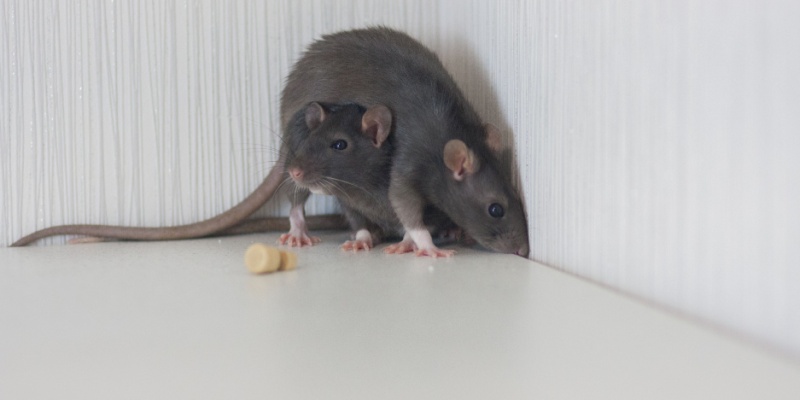Rodents, including mice and rats, are more than just an occasional nuisance—they can cause extensive damage to your home and even pose health risks to your family. If you suspect that you have a rodent problem, it’s crucial to act quickly to prevent the infestation from growing. But how do you determine if you have a rodent infestation in your home? Here are some of the key signs to look out for and steps to take to confirm whether or not rodents have invaded your space:
1. Signs of Droppings
One of the most obvious signs of a rodent infestation is the presence of droppings. Mice and rats leave droppings near their nesting areas and food sources, which can give you a good indication of where they are most active. Mouse droppings are small, dark, and shaped like pellets, while rat droppings are larger and have a blunt end. Droppings are often found in cupboards, pantries, under sinks, and along walls where rodents travel.
If you start noticing droppings in your home, it’s a clear sign that rodents are present. The more droppings you find, the more likely it is that you’re dealing with a larger infestation. Be cautious when handling rodent droppings, as they can carry diseases. It’s best to use gloves and disinfect the area immediately.
2. Gnaw Marks and Chewing Damage
Rodents constantly gnaw to keep their teeth sharp, and as a result, they can cause significant damage to your home. Look for gnaw marks on wires, furniture, baseboards, and even food packaging. Mice and rats are known to chew through insulation, drywall, and even plastic, so damage to these materials is a strong indicator of a rodent infestation.
Chewing through electrical wiring is one of the more dangerous risks of a rodent infestation. It can lead to electrical fires, so if you notice frayed wires or electrical problems in your home, rodents may be the cause. Spotting gnaw marks in multiple areas of your home is a sign that the rodents are spreading, and you should act quickly to prevent further damage.
3. Scratching and Scurrying Noises
Rodents are nocturnal, so you’re most likely to hear them at night. If you hear scratching, scurrying, or rustling sounds coming from the walls, ceiling, or attic, it’s a strong indication that rodents are present. Mice and rats often travel through walls and ceilings, using these spaces to move around your home unnoticed. Pay close attention to any unusual noises at night, especially in quiet parts of your home like attics or basements.
In some cases, you may even hear them running or scratching under the floors or inside cabinets. If these noises persist, there’s a high likelihood that you have an infestation, and the rodents may be nesting inside your walls or attic.
4. Grease Marks and Tracks
As rodents travel around your home, they leave behind greasy trails and marks. These can appear as dark smudges or streaks along walls, baseboards, or in areas where they frequently move. The grease comes from their fur, which picks up oil and dirt from their environment.
In addition to grease marks, you may also notice small footprints or tail marks in dusty areas. If you suspect rodents but haven’t found any droppings or damage yet, checking for these subtle signs can help confirm the presence of an infestation.
5. Nests and Nesting Materials
Rodents build nests using materials like shredded paper, fabric, insulation, and other soft items. These nests are usually hidden in dark, secluded areas of your home, such as behind appliances, in attics, basements, or inside walls. If you come across a pile of shredded materials in any of these areas, it’s likely that rodents have built a nest there.
Mice and rats prefer to nest close to food and water sources, so you might find nests near your kitchen or pantry. The presence of a nest usually means that the rodents are breeding, and the infestation could quickly grow if left untreated.
6. Unpleasant Odors
A rodent infestation often comes with a distinct, unpleasant odor. The smell is typically a combination of rodent urine, droppings, and decaying materials, and it can become quite strong if the infestation is severe. You might notice this odor in areas where the rodents are most active, such as near their nesting spots or food sources.
In some cases, the odor might be caused by a dead rodent that has been trapped inside a wall or under the floor. If you notice a persistent foul smell and can’t locate the source, it could be a sign of a rodent problem that requires professional help to address.
What to Do If You Suspect a Rodent Infestation
If you’ve noticed any of these signs, it’s important to take action quickly. Rodents can cause serious damage to your home and pose health risks, so early detection is key. While setting traps or using bait might help reduce the population, a professional pest control service can provide a more comprehensive solution.
The pest control experts at Bug Baron Exterminator will conduct a thorough inspection to confirm the extent of the infestation, identify entry points, and create a tailored treatment plan to eliminate the rodents and prevent future infestations. With professional help, you can ensure your home is rodent-free and protect your property from further damage.
